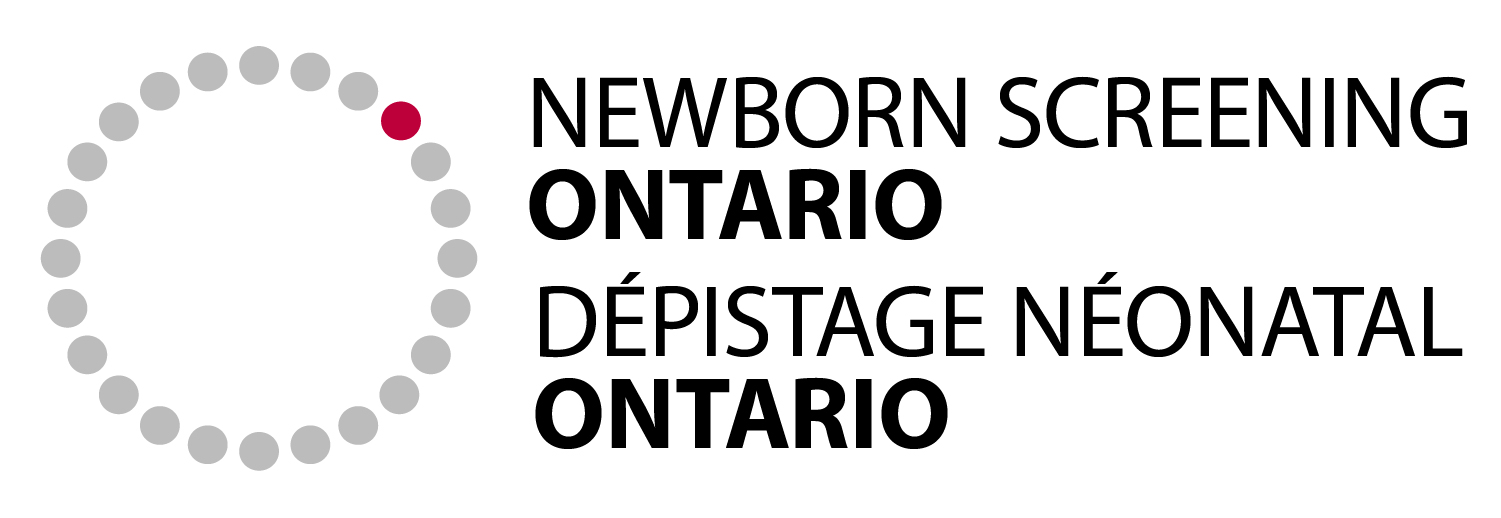- In Ontario, a heel prick is used to take a few drops of blood from each baby shortly after birth. The blood is tested for more than 25 treatable diseases, including Severe Combined Immune Deficiency (SCID).
- A screen positive result means that more tests are needed to know whether or not a baby has SCID. It does not mean that a baby has SCID. Babies identified at a young age through screening can be treated early to help prevent health problems.
Severe Combined Immune Deficiency (SCID)
At a glance
| Approximate incidence in Ontario: | Marker measured: | Screening can prevent: | Treatment: |
| 1 in 50,000 | T-Cell Receptor Excision Circles (TRECs) | Severe and life-threatening infections | Medications, bone marrow transplant, enzyme replacement therapy, gene therapy |
SCID is a group of rare, inherited (genetic) diseases that affect the immune system, the body’s natural defense against infections.
- Babies with SCID are missing important immune cells.
- These babies are at risk for many infections which could become fatal.
- SCID is not contagious.
If diagnosed early:
- Treatments exist to help and sometimes cure children with SCID before they become ill.
- These treatments can save the baby’s life.
- It is normal for parents and guardians to feel worried when their baby has a screen positive result. A ‘screen positive’ result does not mean that a baby has SCID. It means that there is a chance that the baby may have SCID.
- Follow-up testing is important to find out whether the baby truly has SCID.
- The baby’s health care provider or a health care provider at a newborn screening regional treatment centre will discuss the results with the baby’s family.
- Follow-up blood tests are arranged as soon as possible.
- It can take a few days to weeks to find out if a baby truly has SCID or not. This waiting period can be hard for families. Families may be given special instructions to follow during this waiting period.
Possible follow-up test results
- Normal – the baby does not have SCID.
- Abnormal – the baby does have SCID and will need treatment. The family will be supported by a team of caring specialists. Testing will be needed to determine the specific type of SCID.
- Inconclusive – more testing is required. The baby will be followed closely by an immunologist (an immune system specialist) to ensure that he/she receives optimal care. Sometimes babies are found to have other conditions which cause an immune deficiency as one of their symptoms.
Babies with SCID are protected by their mother’s immune system for a little while after birth. Screening can detect SCID before symptoms appear.
Without treatment, early signs of the disease begin in the first months of life and can include:
- poor growth
- diarrhea
- frequent infections
- ear infections
- lung infections
- thrush (a fungal infection in the throat)
- infections that do not go away with treatment
Early treatment helps to prevent serious and life-threatening infections such as:
- pneumonia (lung infection)
- meningitis (infection of the brain lining)
- sepsis (blood infection)
1) Bone marrow transplant
Immune cells are made in the bone marrow. The most common and effective treatment for SCID is a bone marrow transplant from a person with a healthy immune system. A sibling donor is the best option, but parents or unrelated donor may be used.
- This replaces the baby’s immune system with a healthy immune system.
- Bone marrow transplantation can cure SCID.
- There is a high chance of success if the transplant is done in the first months of life while the baby is healthy.
- A healthy donor can re-grow the bone marrow cells that they donated.
2) Short-term therapies
These therapies may be necessary until a bone marrow transplant can be done.
- Isolation
- Limiting contact with people, especially young children, to avoid catching infections.
- Antibiotics
- Antibiotics can prevent and treat infections
- Antibody therapy
- Antibodies are proteins made by the immune system that help fight infections.
- Babies with SCID cannot make their own antibodies.
- Antibody injections can help protect babies with SCID and provide them with some protection against common infections.
- Avoid Live Vaccines
- Certain vaccines (especially rotavirus, measles, mumps, rubella and varicella) cannot be given until the baby has a working immune system.
3) Other therapies
Some types of SCID have different treatment options such as enzyme replacement therapy and gene therapy. These will be offered by the immunologist, if available.
- With screening and early treatment, most babies with SCID will be able to lead normal healthy lives.
- Babies are less likely to develop life-threatening infections when treatment starts early.
- A bone marrow transplant in the first months of life, while the baby is healthy, has a very high rate of success.
If your baby has screened positive for SCID, click here for more information.
Contact Us
Children’s Hospital of Eastern Ontario
415 Smyth Road
Ottawa, Ontario K1H 8M8
Toll-Free: 1-877-627-8330
Local: (613) 738-3222
Fax: (613) 738-0853
